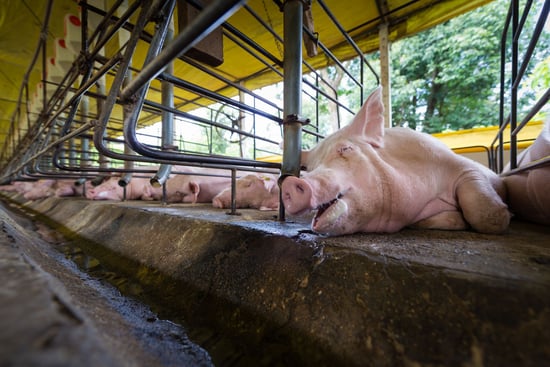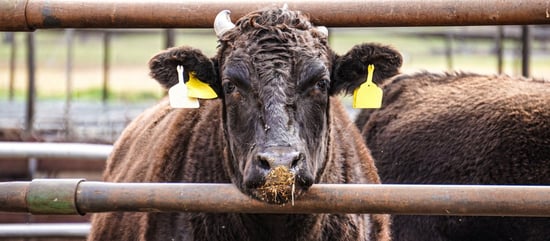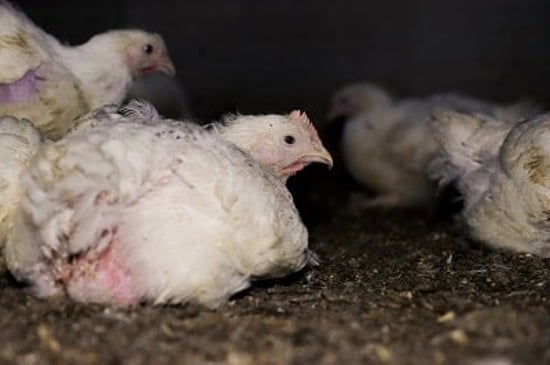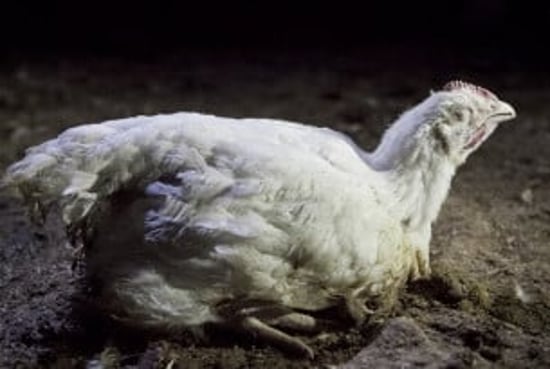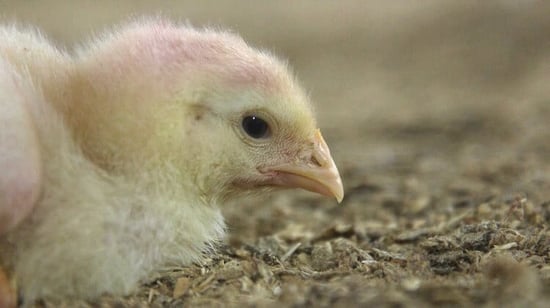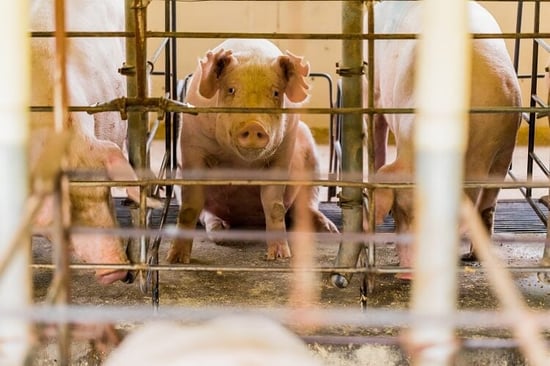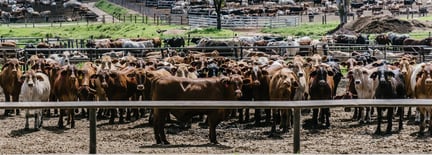
Unimaginable pain for billions of animals
Factory farming
Image credit: Farm Transparency Project
From painful mutilations, early weaning and poor air quality to unnatural feeding regimes, rough handling, long-distance transport and ultimately slaughter at a young age – animals on factory farms suffer on many levels.
Within the harsh confinements of factory farms, animals are painfully mutilated and kept in cramped, barren cages, pens, and sheds. It is impossible for them to fulfil their hardwired instincts to forage or perch, build nests, and interact with one another in comfort. This, in turn, causes them severe stress, injuries, ailments, hunger, and social deprivation.
The demand for cheap meat is equating to more animals being churned through factory farms like cogs in a machine. It is inhumane to treat animals like pigs, chickens, cows and many others like commodities when they are living beings who feel complex emotions such as pain, joy, and fear – just like us.
We need to break the cycle of suffering in our global food system as it is not healthy for anyone – the consumers, the workers, the animals, or the planet we call home.
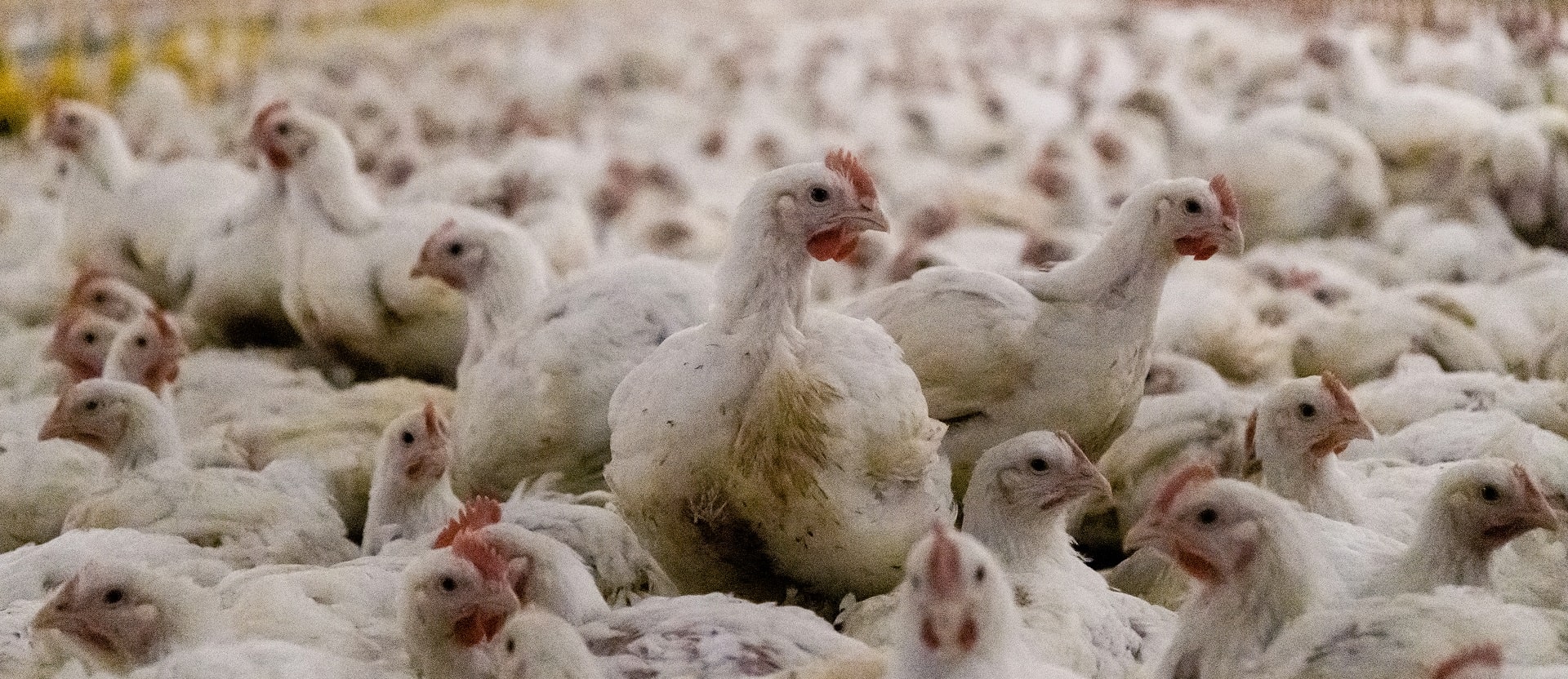
Chickens
Image credit: World Animal Protection / Tracks Investigations
Chickens are only rationed an area the size of an iPad
They are sensitive, with distinct personalities and so intelligent they can tell between people they know and strangers. Sadly, they are not treated as living beings with feelings but as cogs in a machine – experiencing pain and suffering at every stage of their short lives.
Every year, over 700 million hens are raised for slaughter in Australia's intensive farms, often with little natural light or fresh air, unable to peck or spread their wings. They are bred to grow unnaturally large and at an unhealthy rate so they often suffer from painful lameness, overworked hearts and lungs, and wounds like skin sores and burns.
Call on KFC to give chickens better lives
Fast-food giant KFC is one of Australia’s most established restaurants with more than 700 stores.
But despite being famous for their chicken, World Animal Protection’s 2024 report 'Fast Food, Slow Progress' report shows that KFC are lagging behind major fast-food companies around the world including their counterparts in the UK and Europe when it comes to chicken welfare.
KFC Australia have so far declined to sign the Better Chicken Commitment. This means they continue to let chickens suffer in their supply chain.
No animal deserves the life these chickens live. By signing our petition, you’re calling on KFC to sign the Better Chicken Commitment and put a stop to the cruelty these creatures experience.
The ANZ Better Chicken Commitment
The ANZ Better Chicken Commitment (BCC) is a leading set of science-based standards to improve the lives of chickens across the food industry in Australia and Aotearoa New Zealand.
The policy addresses some of the biggest causes of suffering on chicken farms by creating standards that aim to provide chickens with more room to move and express their natural behaviours, more natural light, air quality, the inclusion of enrichments such as perches and less suffering at slaughter.
Most importantly, the BCC bans the use of unnaturally fast-growing chicken breeds who are slaughtered in just five to six short weeks.
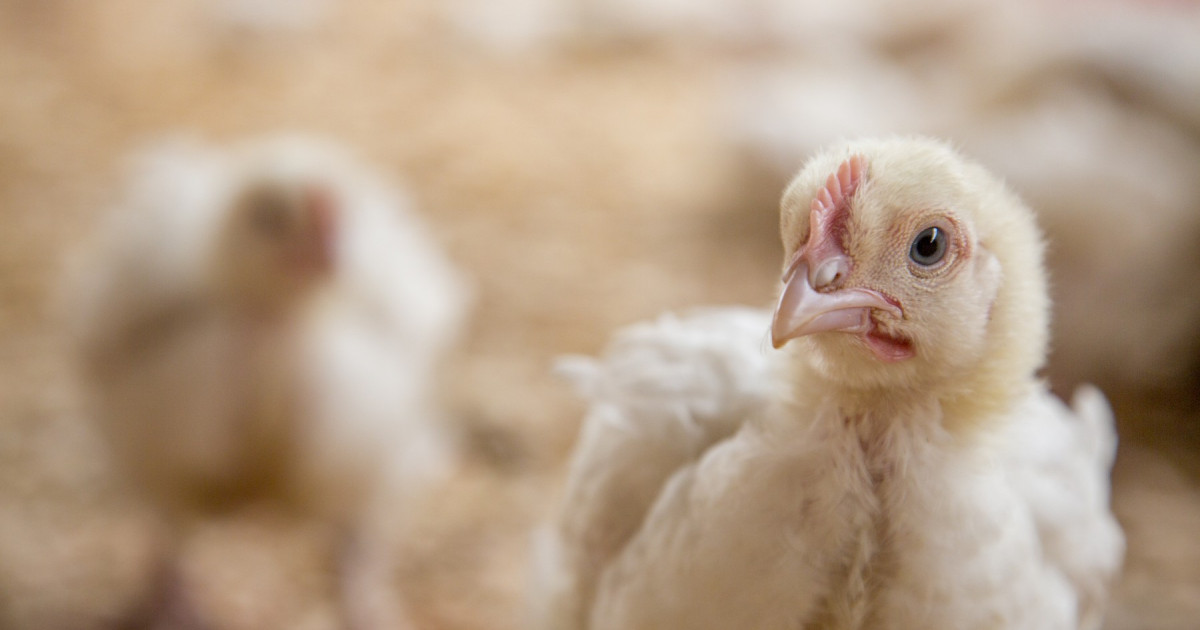
Chickens who are farmed for their meat often live short and painful lives as their rapid growth causes them to suffer various ailments including lameness and chronic heart and lung conditions. Baby chickens may sometimes suffer organ failure weeks after they hatch.
In order to ensure no chicken ever endures such a horrific fate, the New Zealand Society for the Prevention of Cruelty to Animals (SPCA), Animals Aotearoa and The Humane League with support from World Animal Protection and eight other global animal welfare organisations including Compassion in World Farming, developed an Australia and New Zealand version of the Better Chicken Commitment that is used in Europe and North America.
By making the commitment, food businesses and restaurant chains in Australia can show their consumers that they care about giving meat chickens in their supply chains better lives.
Domino’s was the first company in Australia and Aotearoa New Zealand that was moved to sign this commitment. Today, eight more have joined in to give their chickens lives worth living.
Our 2024 report ‘Fast Food, Slow Progress’ found that there have been over 600 commitments by food companies around the globe but only one commitment in Australia so far. It also found that while KFC in the UK and six other countries across Europe have adopted the BCC, KFC in Australia has so far declined to do so. The same can be said for Hungry Jacks, Starbucks, Subway, Nando’s and Pizza Hut who have not even taken the first step to protect chickens in their Australian supply chain from the suffering caused by unnatural growth.
With your support, we will continue calling on more companies to commit to the humane treatment of chickens.
The Pecking Order
Read our 'Pecking Order' report and find out how global fast-food brands are responding to the chicken crisis.
Give KFC chickens better lives
Call on KFC to sign the Better Chicken Commitment and put a stop to the cruelty these creatures experience.
Donate to protect chickens
In industrial farming, a chick may go her entire life without seeing sunlight. Together, we can give chickens lives worth living.
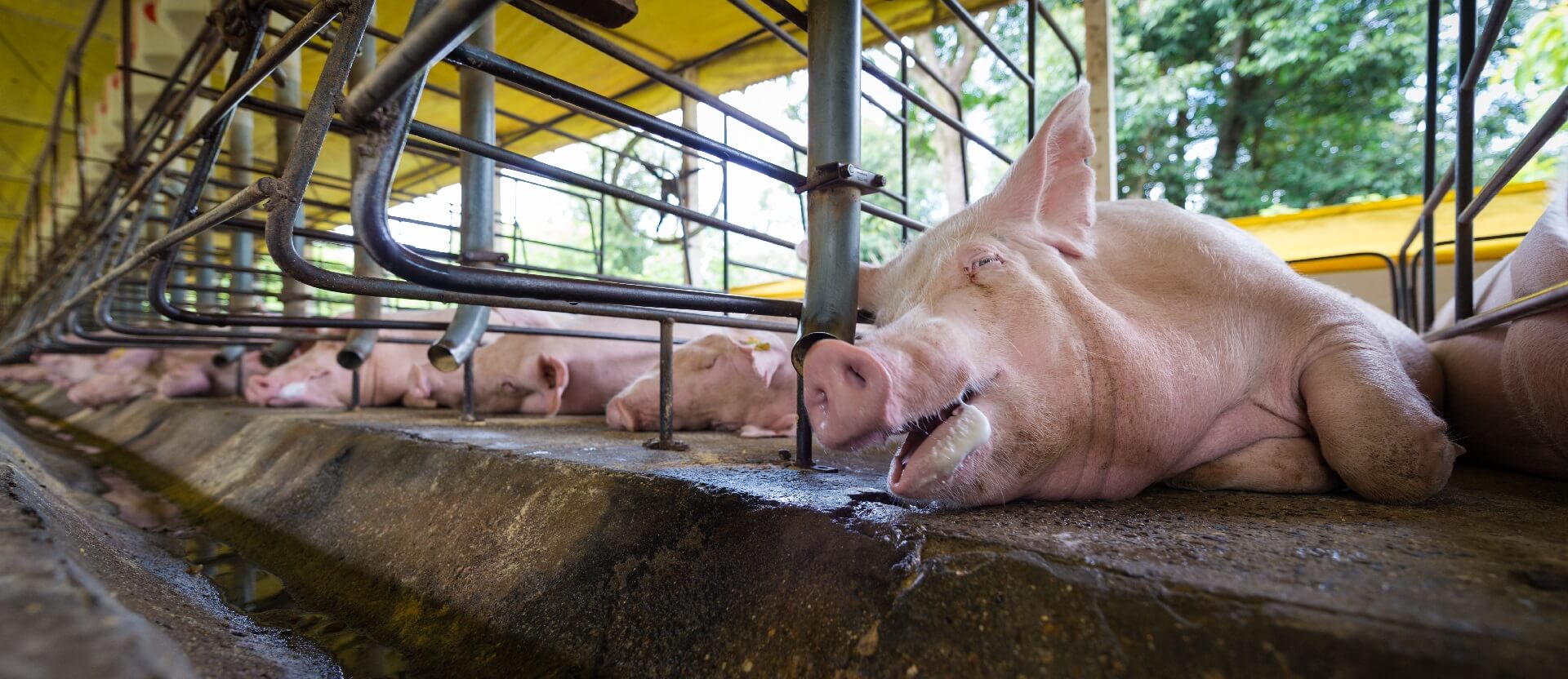
Pigs
Pigs live in horrifying conditions on factory farms
Pigs are intelligent, curious and empathetic animals. Given a choice, they would spend their days socialising, rooting for food and resting on comfortable beds.
Yet, pigs farmed for meat will never get to show off their intelligence or follow their instinctive curiosity as they are confined to barren, small steel cages on factory farms with uncomfortable flooring, which cause them to suffer painful skin lesions and diseases. Mother pigs have it especially bad as they are inseminated in a cage no bigger than an average household refrigerator, with barely enough room to move. While most are then moved into group housing, about 20% of mother pigs in Australia are still confined to sow stalls for most of their pregnancy.
In the first week of a baby pig’s life, his or her teeth are clipped or ground, the tail is cut, and males can be castrated, often without pain relief.
With your help, we work to push for pigs to have the opportunity to express natural behaviour and socialise, free from cages and painful mutilations. Let's call on the industry to make a change and give pigs a life worth living.
A Pig's Tale
Read our 'Pig's Tale' report and learn about how pigs suffer on factory farms.
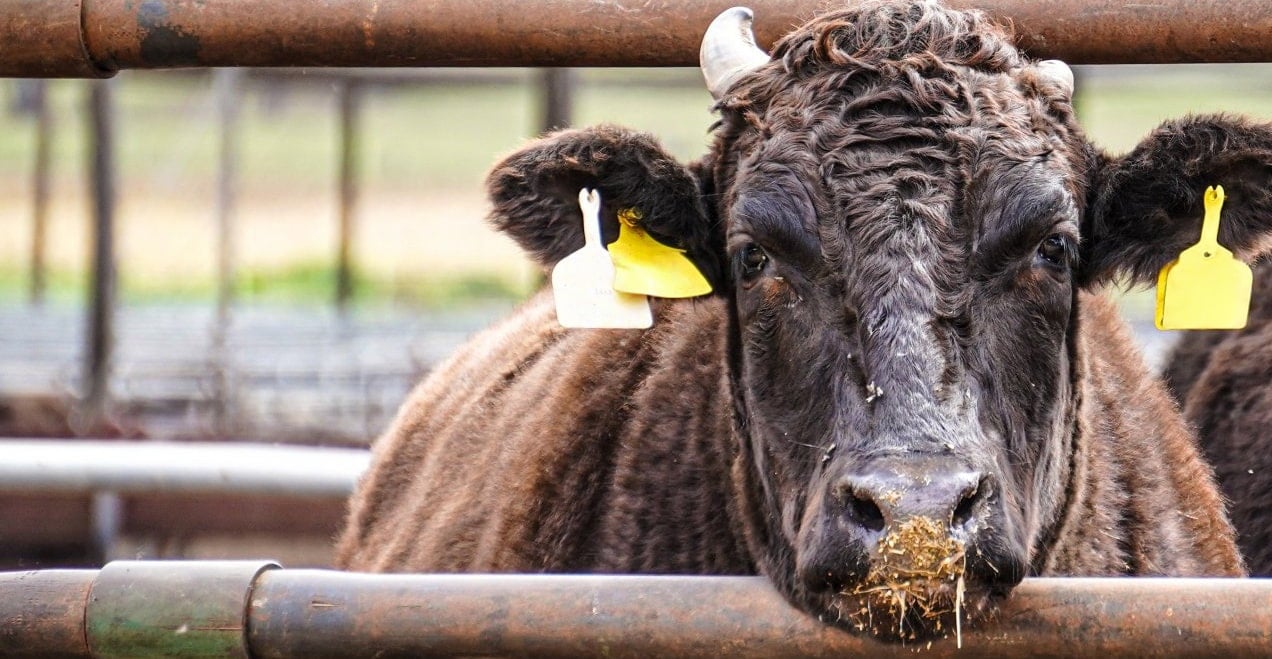
Beef cattle
Image credit: AnimalKind
Cattle raised for beef production are forced to spend their final months in “feedlots” to be fattened for slaughter.
Cows, both male and female, are naturally inquisitive animals who enjoy grazing and socialising with their herd. Despite having a natural lifespan of 15 to 20 years, for many their lives are tragically cut short at just 12 to 18 months when they are slaughtered for beef.
During the final months of their lives, most grain-fed cattle are confined to gated, barren yards known as feedlots. This cruel practice aims to fatten them to make them ready for slaughter as quickly and cheaply as possible.
How are beef cattle raised?
Most of these animals are born on paddocks and eventually weaned onto pasture, but nothing can prepare them for the cruel environment they face on a feedlot. This sudden change in their environment is one of the most stressful experiences of a cow’s life. They lose the ability to express their natural foraging behaviours, move about freely, or choose who they spend time with.
What do feedlot cattle eat?
These animals who typically eat grass, are made to eat an unnatural, grain-based diet so they reach slaughter weight faster than is natural. If done too quickly, this transition can lead to serious medical conditions such as acidosis or even a painful death.
Animal welfare issues on feedlots
Like other factory farms, feedlots are rife with animal welfare issues. Cows are regularly exposed to extreme heat, unsanitary conditions, and disease outbreaks. They can suffer from footrot, liver disease, heat stress, and various other ailments.
In Australia, there is currently no legal requirement to provide cows with shade, bedding, or enrichment. On a feedlot, cows are often mixed with unfamiliar social groups and lack adequate space to roam freely as compared to their life on pasture. As they grow unnaturally quickly, their living space becomes increasingly restricted and cramped.
Once they reach slaughter weight, these gentle animals are crammed into transport trucks and are forced to endure long, gruelling journeys to a slaughterhouse. Their food and water can legally be withheld for up to 48 hours, making their final moments even more distressing.
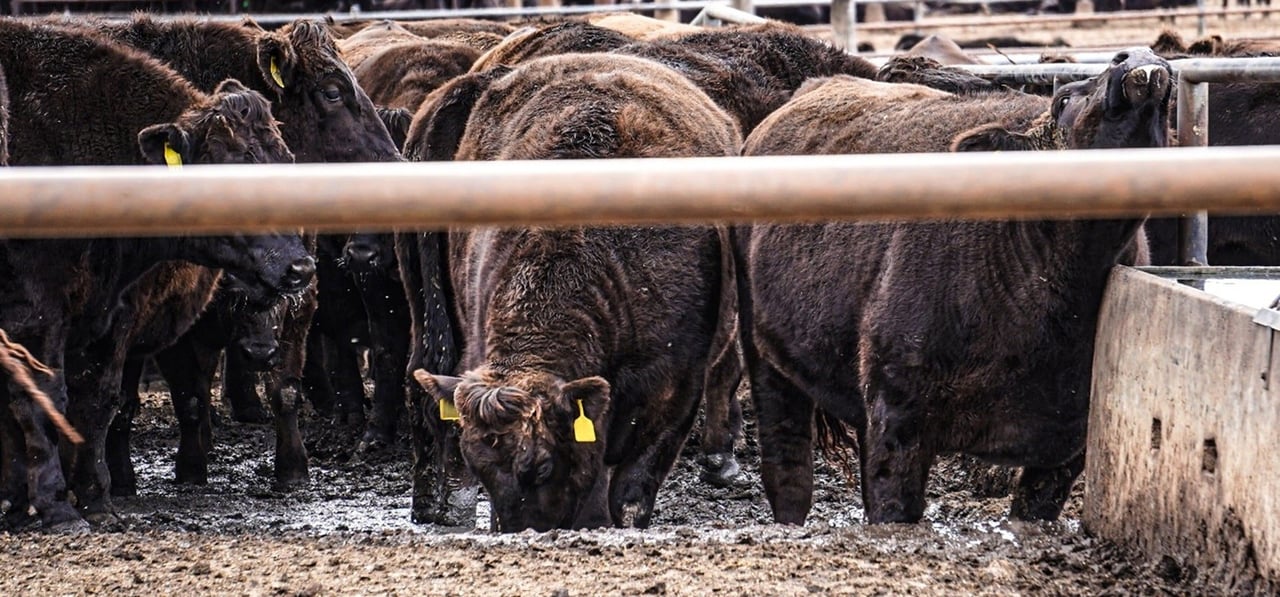
Beef labels in Australia: What do they really mean?
Right now, beef producers in Australia are not required to specify on their labels if their product comes from a feedlot, which can limit a consumer’s ability to make informed choices about animal welfare. Instead, they may use terms such as “grain-fed” and “grain-finished” - all of which are unclear ways of saying that the animal has spent time on a feedlot. A majority of beef products labelled "Wagyu" also come from feedlots.
No living being deserves to endure such misery for the profit of others. In order to create a more humane future, it’s up to governments, investors, food retailers, and consumers to take steps that will create better animal welfare conditions and humane alternatives to feedlots.
With you by our side, we can expose the cruelty behind beef cattle feedlots and take the ‘factory’ out of ‘farming’.
Your guide to beef cattle feedlots in Australia
Everything you need to know about feedlots in Australia, beef labels, and more.
Know your labels
Your food
Factory farming resulting from the rapid growth in demand for cheap meat and dairy products means farm animals experience relentless suffering.

